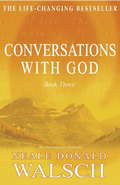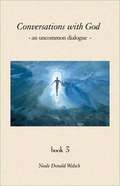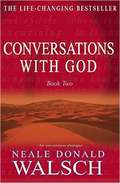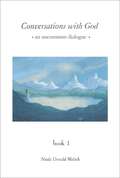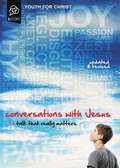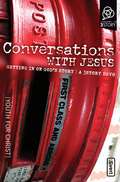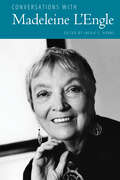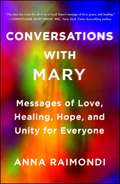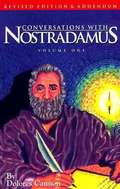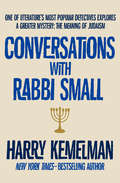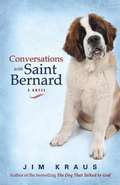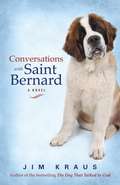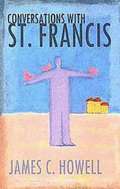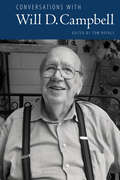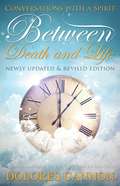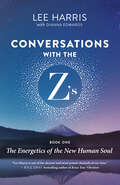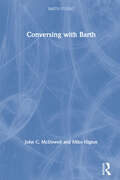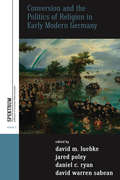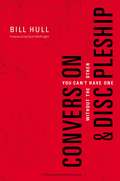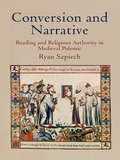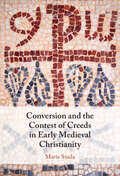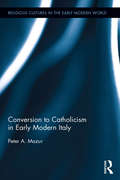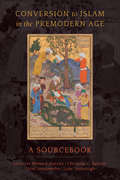- Table View
- List View
Conversations with God - Book 3: An uncommon dialogue
by Neale Donald WalschThe dialogue expands . . . When Neale Donald Walsch was experiencing one of the lowest points of his life, he decided to write a letter to God. What he did not expect was a response, with extraordinary answers covering all aspects of human existence - from happiness to money, to faith. The resulting book, Conversations with God, was an instant bestseller on publication in 1995 and has since sold millions of copies world-wide, changing countless lives everywhere. Conversations with God: Book 3 is the third volume of the original Conversations with God trilogy that takes us even further in our questioning and search for answers, dealing with universal truths of the highest order and the challenges and opportunities of the soul. This incredible series contains answers that will change you, your life and the way you view others.Also by Neale Donald Walsch and available from Hodder & Stoughton: Conversations with God, Books 2 and 3, Communion with God, Friendship with God, Applications for Living and Meditations from Conversations with God, Book 1.
Conversations with God: An Uncommon Dialog, Vol. 3
by Neale Donald Walschthe author continues his conversation with God begun in book 1. matters of a cosmic nature are discussed.
Conversations with God: An Uncommon Dialogue (Conversations with God #1)
by Neale Donald WalschSuppose you could ask God the most puzzling questions about existence - questions about love and faith, life and death, good and evil. Suppose God provided clear, understandable answers. It happened to Neale Donald Walsch. It can happen to you. You are about to have a conversation... <P><P> I have heard the crying of your heart. I have seen the searching of your soul. I know how deeply you have desired the Truth. In pain have you called out for it, and in joy. Unendingly have you beseeched Me. Show Myself. Explain Myself. Reveal Myself. I am doing so here, in terms so plain, you cannot misunderstand. In language so simple, you cannot be confused. In vocabulary so common, you cannot get lost in the verbiage. So go ahead now. Ask Me anything. Anything. I will contrive to bring you the answer. The whole universe will I use to do this. So be on the lookout; this book is far from My only tool. You may ask a question, then put this book down. But watch. Listen. The words to the next song you hear. The information in the next article you read. The story line of the next movie you watch. The chance utterance of the next person you meet. Or the whisper of the next river, the next ocean, the next breeze that caresses your ear - all these devices are Mine; all these avenues are open to Me. I will speak to you if you will listen. I will come to you if you will invite Me. I will show you then that I have always been there. All ways.
Conversations with God: An Uncommon Dialogue (Conversations with God #2)
by Neale Donald WalschWalsch continues his conversation with God that was started in book 1 in question and answer fashion. Politics and education are discussed along with other topics of global scope.
Conversations with God: An Uncommon Dialogue, Book 1 (Conversations with God Series)
by Neale Donald WalschConversations with God Book 1 began a series that has been changing millions of lives for more than ten years. Finally, the bestselling series is now a movie, starring Henry Czerny (The Pink Panther and Clear and Present Danger) and Ingrid Boulting (The Last Tycoon). Produced and directed by Stephen Simon (producer of Somewhere in Time and What Dreams May Come) and distributed by Samuel Goldwyn Films and Fox Home Entertainment, the theatrical release is set for October 27, 2006. The movie is the true account of Walsch (played by Cierny), who went from an unemployed homeless man to an "accidental spiritual messenger" and author of the bestselling book
Conversations with Jesus, Updated and Revised Edition: Talk That Really Matters
by Youth For ChristHelp your students hear what Jesus has to say to them Following the Youth For Christ 3Story® model of evangelism, this 60-day devo presents Scripture to students in daily letters from Jesus. They’ll learn to abide in Christ and connect their own story to God’s story through the daily readings and journaling opportunities. In this daily conversation they’ll discover their role in God’s story.
Conversations with Jesus: Getting in on God's Story
by Youth For ChristHelp your students hear what Jesus has to say to them Following the Youth For Christ 3Story® model of evangelism, this 60-day devo presents Scripture to students in daily letters from Jesus. They’ll learn to abide in Christ and connect their own story to God’s story through the daily readings and journaling opportunities. In this daily conversation they’ll discover their role in God’s story.
Conversations with Madeleine L'Engle (Literary Conversations Series)
by Jackie C. HorneConversations with Madeleine L’Engle is the first collection of interviews with the beloved children’s book author best known for her 1962 Newbery Award–winning novel, A Wrinkle in Time. However, Madeleine L’Engle's accomplishments as a writer spread far beyond children’s literature. Beginning her career as a literary novelist for adults, L’Engle (1918–2007) continued to write fiction for both young and old long after A Wrinkle in Time. In her sixties, she published personal memoirs and devotional texts that explored her relationship with religion. At the time of her death, L’Engle was mourned by fans of her children’s books and the larger Christian community.L’Engle’s books, as well as her life, were often marked by contradictions. A consummate storyteller, L’Engle carefully crafted and performed a public self-image via her interviews. Weaving through the documentable facts in these interviews are partial lies, misdirections, and wish-fulfillment fantasies. But, when read against her fictions, these “truths” can help us see L’Engle more deeply—what she wanted for herself and for her children, what she believed about good and evil, and what she thought was the right way and the wrong way to be a family—than if she had been able to articulate the truth more directly.The thirteen interviews collected here reveal an amazing feat of authorial self-fashioning, as L’Engle transformed from novelist to children’s author to Christian writer and attempted to craft a public persona that would speak to each of these different audiences in meaningful, yet not painfully revealing, ways.
Conversations with Mary: Messages of Love, Healing, Hope, and Unity for Everyone
by Anna RaimondiProminent spiritual counselor and medium Anna Raimondi channels the Blessed Mother in this insightful, prescriptive, and timely dialogue that not only acts as a guide to modern spirituality but celebrates the Mother Mary as a central figure for all people and religions across the globe.At age five, in the backyard of her suburban Long Island home, Anna Raimondi had a profound experience. A contemplative child, she slid her body into the small grotto that once held a statue of the Blessed Mother. Anna remembers “a feeling of pure and unadulterated peace.” In that peace, she heard a voice. It was gentle and strong, and it said, “Anna, I am here for you always. Always come to me.” That was the beginning of their first conversation. And while many more followed, the ones included in this book took place in the last year and follow Mary’s emphatic, progressive message that she wants to be heard by all, regardless of religious affiliation. Through Anna, Mary touches and teaches important truths about: - A soul, its immortal nature and the lessons along each soul’s journey. - Prayer, its power, the right way to pray, and the difference between surrendering to God and not taking responsibility for one’s actions. - What happens when we die, with revelations into the realities of heaven, hell, purgatory, and reincarnation. Mary also provides insightful answers to questions about terrorism, the world’s refugee crisis, racism, gender inequality, marriage equality, and more. Her conversations with Anna are simultaneously illuminating, inspiring, and provocative, and offer you a guide to go back to the simple messages God gave us of love and peace.
Conversations with Nostradamus
by Dolores CannonCommunication from Nostradamus via several mediums through hypnosis, supervised by Dolores Cannon. Includes the Prophecies of Nostradamus, translated into English from Middle French, and an index.
Conversations with Rabbi Small (The Rabbi Small Mysteries #8)
by Harry KemelmanRabbi Small takes a break from solving murder cases to investigate a far greater mystery: the intricacies of Judaism In Conversations with Rabbi Small, the rabbi finds himself taking a well-deserved vacation at a Jewish retreat in the mountains, where he reads, plays cards, and furthers his studies, which have been languishing for too long. When the rabbi's wife is called back to the city to deal with an illness in the family, the rabbi meets a curious young woman in the midst of a life-changing moment. Joan is a gentile who is about to marry a Jewish man, and she is desperate for answers as she determines whether or not to convert to her betrothed's religion. In Rabbi Small, she finds an ideal teacher. In a series of impassioned conversations, the rabbi guides her through the ancient mysteries and wonders of Judaism, giving guidance to both her and her husband-to-be. With humor and compassion, the rabbi shares the history, beliefs, and traditions that have linked Jewish people across the world for millennia.
Conversations with Saint Bernard
by Jim KrausGeorge Gibson is determined to check off the last item on his bucket list: a trip across America. He hops in his RV to visit - and sketch - the buildings and places across America that he and his wife never got to see. When his daughter learns of a young boy forced to give up a beloved Saint Bernard named Lewis, she suggests George adopt the animal as a traveling companion. The dog even fits perfectly in the sidecar of George's Vespa motor scooter. As George warms to his travel mate, he begins talking to Lewis, sharing stories from his life and his unrealized dreams. Along the way, Lewis seems to attract people and make instant friends with the quirky and charming, funny and odd people who cross their path. Could it be that his new friends - and this strange dog - will help George to finally confront the secret he's been hiding? Can Lewis's devotion to the truth be enough to save George from himself?
Conversations with Saint Bernard: A Novel
by Jim KrausGeorge Gibson is determined to check off the last item on his bucket list: a trip across America. He hops in his RV to visit - and sketch - the buildings and places across America that he and his wife never got to see. When his daughter learns of a young boy forced to give up a beloved Saint Bernard named Lewis, she suggests George adopt the animal as a traveling companion. The dog even fits perfectly in the sidecar of George's Vespa motor scooter. As George warms to his travel mate, he begins talking to Lewis, sharing stories from his life and his unrealized dreams. Along the way, Lewis seems to attract people and make instant friends with the quirky and charming, funny and odd people who cross their path. Could it be that his new friends - and this strange dog - will help George to finally confront the secret he's been hiding? Can Lewis's devotion to the truth be enough to save George from himself?
Conversations with St. Francis
by James C. HowellIf you were able to talk to St. Francis of Assisi, what would you ask him? “Perhaps,” says James Howell,” the first question I’d want to ask Francis would be something like this: How did you do it? Were you real? How much of your story really happened? And I’m asking because I am wondering how I might do it: could I somehow grab a share of the life you had? The marvel in Francis’s story is that all he did seems entirely doable – but then, at the same time, ridiculously impossible. As I survey the bare facts of his life, it all seems so manageably simple, and yet unquestionably what happened was nothing short of miraculous.”In this spiritually apt look at the life, message, and meaning of St. Francis, Howell invites all of us to pose our most difficult spiritual questions to the saint–and to listen for the questions he asks of us in response.
Conversations with Will D. Campbell (Literary Conversations Series)
by Tom RoyalsConversations with Will D. Campbell is the first collection of interviews with the southern preacher, activist, and author best known for his involvement with the civil rights movement. Ranging from a 1971 discussion about religion and ending with a previously unpublished interview conducted in 2009, these twelve interviews give insight to Campbell's unique religious beliefs and highlight pivotal moments of his career.Will D. Campbell (1924-2013) was born poor in rural Mississippi and became an ordained minister when he was barely seventeen years old. After serving in the Army during World War II, Campbell ministered in a variety of positions, including a pastorate in Louisiana, as religious director at the University of Mississippi, and as a race relations consultant for the National Council of Churches. Along the way, Campbell worked with civil rights figures, Klansmen, Black Panthers, and country music icons, believing all were equal in the eyes of God. Throughout his career, Campbell drew attention for criticizing the institutional churches and supporting women's rights, gay rights, and school desegregation.From 1962 through 2012, Campbell published over fifteen books including novels, biographies, and memoirs. His first book, Race and the Renewal of the Church, introduced his theories of reconciliation and the failures of institutional churches. His best-known work, Brother to a Dragonfly, was a National Book Award finalist.
Conversations with a Spirit: Between Death and Life
by Dolores CannonDolores has accumulated information about the Death experience and what lies beyond through 16 years of hypnotic research and past-life therapy. While retrieving past-life experiences, hundreds of subjects reported the same memories when experiencing their death, the spirit realm, and their rebirth. This book also explores: * Guides and guardian angels * Ghosts and poltergeists * Planning your present lifetime and karmic relationships before your birth * The significance of bad lifetimes * Perceptions of God and the Devil * And much more.
Conversations with the Z’s, Book One: The Energetics of the New Human Soul (Conversations with the Z's #1)
by Lee Harris“Seeing the world through a multidimensional lens, feeling the world through the multisensory being inside you — that is the purpose of these conversations.” — FROM THE BOOK Lee Harris has been receiving communication from his guides, the Z’s, since 1999. He has made this wisdom available in a variety of ways, helping hundreds of thousands around the world, and now he offers these powerful messages in a one-of-a-kind and distinctly modern format. His channeling is presented in conversation with psychotherapist Dianna Edwards, who describes her work as “listening to hear.” Her questioning allows for a crystal-clear exploration of Lee’s method and a beautifully accessible way of encountering and absorbing the wisdom transmitted from the Z’s. You’ll learn to connect to your guides, interpret and learn from dreams, employ the magnetics of manifestation, and navigate the current environmental and cultural disarray. The material channeled from the Z’s is practical and meaningful — even transformational — for seekers with open hearts and minds.
Conversing with Barth (Barth Studies)
by Mike Higton John C. McDowellKarl Barth addressed all the major themes of dogmatic theology, and in so doing made his own distinctive contribution to each of the ongoing conversations that constitute that theology. This book presents important new 'conversations with Barth' by leading contemporary theologians and Barth scholars. Each contributor offers their own distinctive emphasis to bring to light the ways in which the depths of Barth's work may illuminate or be illuminated by the work of other prominent thinkers who preceded or followed him. The conversations they host between Barth and other philosophers and theologians raise critical questions in the reading and appreciation of Barth's thought, and explore a wide range of themes in dogmatic theology. This book not only adds to the comprehension of the riches of Barth's theology but also presents an important contribution to the ongoing conversations and debates alive in theology today. Contributors: Nicholas Lash, John Webster, Timothy Gorringe, Graham Ward, George Hunsinger, Ben Quash, Mike Higton, John McDowell, Eugene Rogers, Katherine Sonderegger, David Clough, David Ford.
Conversion And The Politics Of Religion In Early Modern Germany
by David M. Luebke David Warren Sabean Jared Poley Daniel C. RyanThe Protestant and Catholic Reformations thrust the nature of conversion into the center of debate and politicking over religion as authorities and subjects imbued religious confession with novel meanings during the early modern era. The volume offers insights into the historicity of the very concept of "conversion." One widely accepted modern notion of the phenomenon simply expresses denominational change. Yet this concept had no bearing at the outset of the Reformation. Instead, a variety of processes, such as the consolidation of territories along confessional lines, attempts to ensure civic concord, and diplomatic quarrels helped to usher in new ideas about the nature of religious boundaries and, therefore, conversion. However conceptualized, religious change-- conversion--had deep social and political implications for early modern German states and societies.
Conversion and Discipleship
by Bill Hull Scot McKnightDiscipleship occurs when someone answers the call to learn from Jesus how to live his or her life as though Jesus were living it. The end result is that the disciple becomes the kind of person who naturally does what Jesus did. How the church understands salvation and the gospel is the key to recovering a biblical theology of discipleship. Our doctrines of grace and salvation, in some cases, actually prevent us from creating an expectation that we are to be disciples of Jesus. <P><P>A person can profess to be a Christian and yet still live under the impression that they don’t need to actually follow Jesus. Being a follower is seen as an optional add-on, not a requirement. It is a choice, not a demand. Being a Christian today has no connection with the biblical idea that we are formed into the image of Christ.In this ground-breaking new book, pastor and author Bill Hull shows why our existing models of evangelism and discipleship fail to actually produce followers of Jesus. He looks at the importance of recovering a robust view of the gospel and taking seriously the connection between conversion—answering the call to follow Jesus—and discipleship—living like the one we claim to follow.
Conversion and Apostasy in the Late Ottoman Empire
by Selim DeringilIn the nineteenth-century Ottoman Empire traditional religious structures crumbled as the empire itself began to fall apart. The state's answer to schism was regulation and control, administered in the form of a number of edicts in the early part of the century. It is against this background that different religious communities and individuals negotiated survival by converting to Islam when their political interests or their lives were at stake. As the century progressed, however, conversion was no longer sufficient to guarantee citizenship and property rights as the state became increasingly paranoid about its apostates and what it perceived as their 'denationalization'. The book tells the story of the struggle between the Ottoman State, the Great Powers and a multitude of evangelical organizations, shedding light on current flash-points in the Arab world and the Balkans, offering alternative perspectives on national and religious identity and the interconnection between the two.
Conversion and Narrative
by Ryan SzpiechIn 1322, a Jewish doctor named Abner entered a synagogue in the Castilian city of Burgos and began to weep in prayer. Falling asleep, he dreamed of a "great man" who urged him to awaken from his slumber. Shortly thereafter, he converted to Christianity and wrote a number of works attacking his old faith. Abner tells the story in fantastic detail in the opening to his Hebrew-language but anti-Jewish polemical treatise, Teacher of Righteousness.In the religiously plural context of the medieval Western Mediterranean, religious conversion played an important role as a marker of social boundaries and individual identity. The writers of medieval religious polemics such as Teacher of Righteousness often began by giving a brief, first-person account of the rejection of their old faith and their embrace of the new. In such accounts, Ryan Szpiech argues, the narrative form plays an important role in dramatizing the transition from infidelity to faith.Szpiech draws on a wide body of sources from Christian, Jewish, and Muslim polemics to investigate the place of narrative in the representation of conversion. Making a firm distinction between stories told about conversion and the experience of religious change, his book is not a history of conversion itself but a comparative study of how and why it was presented in narrative form within the context of religious disputation. He argues that between the twelfth and fifteenth centuries, conversion narratives were needed to represent communal notions of history and authority in allegorical, dramatic terms. After considering the late antique paradigms on which medieval Christian conversion narratives were based, Szpiech juxtaposes Christian stories with contemporary accounts of conversion to Islam and Judaism. He emphasizes that polemical conflict between Abrahamic religions in the medieval Mediterranean centered on competing visions of history and salvation. By seeing conversion not as an individual experience but as a public narrative, Conversion and Narrative provides a new, interdisciplinary perspective on medieval writing about religious disputes.
Conversion and the Contest of Creeds in Early Medieval Christianity
by Marta SzadaAs the Roman Empire in the west crumbled over the course of the fifth century, new polities, ruled by 'barbarian' elites, arose in Gaul, Hispania, Italy, and Africa. This political order occurred in tandem with growing fissures within Christianity, as the faithful divided over two doctrines, Nicene and Homoian, that were a legacy of the fourth-century controversy over the nature of the Trinity. In this book, Marta Szada offers a new perspective on early medieval Christianity by exploring how interplays between religious diversity and politics shaped post-Roman Europe. Interrogating the ecclesiastical competition between Nicene and Homoian factions, she provides a nuanced interpretation of religious dissent and the actions of Christians in successor kingdoms as they manifested themselves in politics and social practices. Szada's study reveals the variety of approaches that can be applied to understanding the conflict and coexistence between Nicenes and Homoians, showing how religious divisions shaped early medieval Christian culture.
Conversion to Catholicism in Early Modern Italy (Religious Cultures in the Early Modern World #22)
by Peter A. MazurIn the sixteenth and seventeenth centuries, conversion took on a new importance within the Catholic world, as its leaders faced the challenge of expanding the church's reach to new peoples and continents while at the same time reinforcing its authority in the Old World. Based on new archival research, this book details the extraordinary stories of converts who embraced a new religious identity in a territory where papal authority and Catholic orthodoxy were arguably at their strongest: the Italian peninsula. Through an analysis of both the unique strategies employed by clerics to attract and educate converts, and the biographies of the men and women—soldiers, aristocrats, and charlatans—who negotiated new positions for themselves in Rome and the other cities of the peninsula, a new image of Italy during the Counter-reformation emerges: a place where repression and toleration alternated in unexpected ways, leaving room for negotiation and exchange with members of rival faiths.
Conversion to Islam in the Premodern Age: A Sourcebook
by Nimrod Hurvitz, Christian C. Sahner, Uriel Simonsohn, and Luke YarbroughConversion to Islam is a phenomenon of immense significance in human history. At the outset of Islamic rule in the seventh century, Muslims constituted a tiny minority in most areas under their control. But by the beginning of the modern period, they formed the majority in most territories from North Africa to Southeast Asia. Across such diverse lands, peoples, and time periods, conversion was a complex, varied phenomenon. Converts lived in a world of overlapping and competing religious, cultural, social, and familial affiliations, and the effects of turning to Islam played out in every aspect of life. Conversion therefore provides a critical lens for world history, magnifying the constantly evolving array of beliefs, practices, and outlooks that constitute Islam around the globe. This groundbreaking collection of texts, translated from sources in a dozen languages from the seventh to the eighteenth centuries, presents the historical process of conversion to Islam in all its variety and unruly detail, through the eyes of both Muslim and non-Muslim observers.
